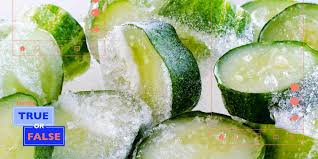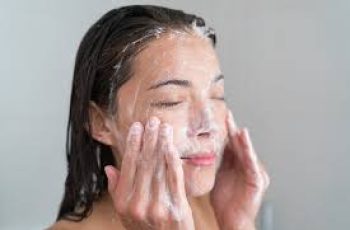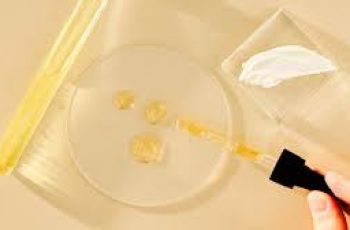
Does Frozen Cucumber Belong In Your Skincare Regimen? Here’s What Experts Say
On TikTok, creators are using frozen cucumbers in place of ice rollers, and say the vegetable can provide added skincare benefits.
Experts said cucumbers could lead to short-term hydrating or skin-soothing benefits.
But experts don’t recommend using frozen cucumber on the face, as it could cause inflammation, allergic reactions, dehydration, or ice burns.
Whether it’s the quintessential spa treatment of sliced cucumbers over the eyes or the latest TikTok hack, cucumbers have long been associated with skincare. But is the vegetable actually helpful for your skin?
On TikTok, creators are finding new ways to incorporate cucumbers into their skincare regiments—in particular, many people say freezing them can lead to a host of benefits.
In a viral video posted last month, creator Addie Beckman explained she uses the blunt end of a frozen cucumber to help make her skin look “glowy and beautiful.”
“It has a ton of added benefits that normal ice or ice rollers don’t have,” she explained. These perks, according to Beckman, include added hydration, a cooling effect, and a reduction in inflammation.
Fellow TikToker Selina da Silva posted a video in which she rubbed a frozen cucumber on her face, calling it a “natural gua sha.” Since it was posted in May, the video has garnered over 10 million views.
Though the low cost and simplicity may tempt people to give this skincare hack a try, experts warn that frozen cucumbers may not actually improve your skin.
“Cucumbers can offer hydration, but there can be irritating side effects, too,” Kim Chang, an aesthetician at the Baylor College of Medicine, told Health.
How Does the Frozen Cucumber Hack Work?
While there’s no official process, this frozen cucumber hack is fairly straightforward—most people simply slice off one end of a cucumber, place it in the freezer, then rub the flat end of the cucumber on their face, as if they were using an ice roller.
There is some variation, however. Some creators put the frozen cucumber on their skin in short bursts, while others recommend leaving the vegetable on for longer periods of time.
Other creators freeze slices of cucumber and then place them on their faces, almost akin to using silicone patches.
Whether it’s whole or in slices, frozen cucumber has garnered a lot of attention online for its alleged skincare benefits. Most commonly, people claim the vegetable can reduce puffiness, reduce signs of aging, soothe sunburn, prevent acne, hydrate skin, and tamp down on hyperpigmentation.
Can Cucumbers Really Do Anything for Your Skin?
It is true that cucumbers could have some positive effects on the skin, explained Joshua Zeichner, MD, director of cosmetic and clinical research in the department of dermatology at Mount Sinai Hospital.
“Cucumbers have a high water content, which is why they are commonly applied to the skin to hydrate and soothe,” Zeichner told Health. “When taken directly from the fridge, the cooling sensation also helps constrict blood vessels and improve puffiness.”
Using something cold to constrict blood vessels can help “the skin calm down from workouts and heat,” said Chang. Also, this blood vessel narrowing, or vasoconstriction effect, may make the skin look tighter, said Doris Day, MD, author and clinical associate professor of dermatology at the NYU Grossman School of Medicine.
However, the hype around applying cucumbers to your skin is largely just that, experts agreed.
Any hydrating or cooling effects a person might get from placing a frozen cucumber on their skin they could also get from an ice cube, Zeichner said.
Something else to consider: This hack’s impact doesn’t last, Day told Health. Any skin-tightening a person sees from the cool cucumber is only temporary, she explained.
And though cucumbers do have natural soothing elements such as antioxidants and vitamins, the skin may not even be able to absorb them, Chang warned.
“Products used on top of the skin will need some type of delivery mechanism to aid in the penetration process,” she said.
Add Cucumber to Your Diet, Not Your Skincare Regimen
Placing cucumbers on your skin could lead to some short-term skincare benefits, however, experts cautioned that people should stay away from this hack—in fact, using cucumber on your face could even make your skin health worse.
For one, cucumbers can cause skin inflammation, especially for people with conditions such as eczema, acne, or psoriasis, said Chang.
Another big concern is the risk of ice burns, said Day.
“Short contact with cold temperatures should not be problematic,” Zeichner added. “But extended exposures can actually be damaging, leading to conditions like frostnip, frostbite, or even the break down of fat under the skin.”
Day noted that leaving room-temperature cucumbers on your skin could be an issue, too. Despite cucumbers’ reputation for being hydrating, leaving them on for too long could actually dehydrate your skin, she said.
“As the water from the cucumber dries off the skin, it will pull water off of your skin and will end up drying it out further,” said Day.
There’s also a risk that cucumbers could carry bacteria that could irritate the skin, especially around sensitive areas such as the eyes or mouth, Chang said.
“There have been many cases where patients have come into the clinic due to an allergic reaction from rubbing cucumbers on their face and placing it over their eyes,” she explained.
Ultimately, experts agree that this beauty hack isn’t really worth your time.
To reap the hydrating and cooling benefits of frozen cucumber, Zeichner recommended people stick with traditional cold metal or stone face rollers. These don’t tend to get as cold as cucumbers “and are likely a safer option for the face,” he said.
And if the promise of additional antioxidants and vitamins from cucumber skincare is appealing, it’s best to simply get these perks from eating the vegetable.
“The best way to use a cucumber for skin health is to eat it or mix it into your smoothie,” Chang said.


